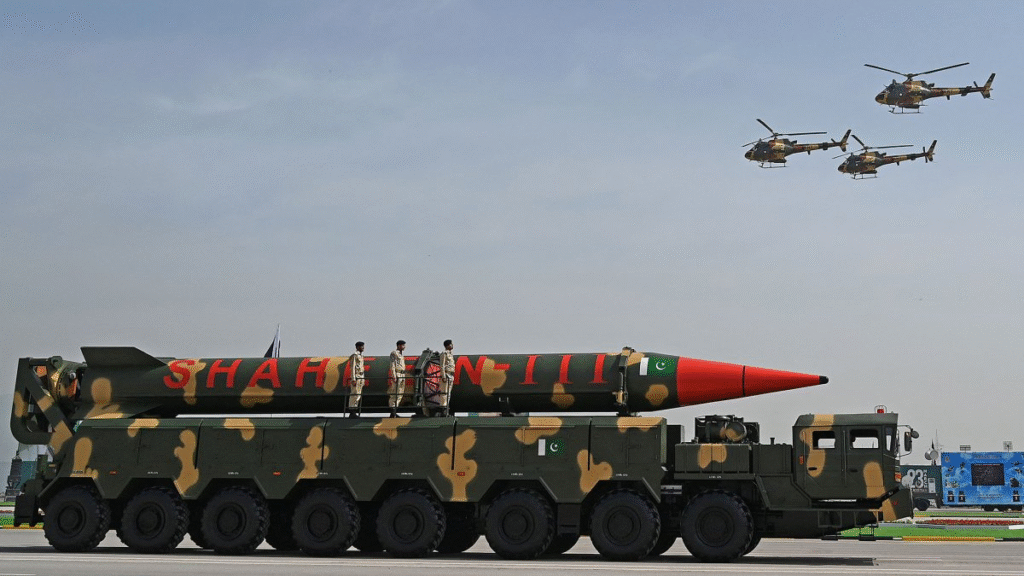Is Pakistan’s Nuclear Missile Program Aimed at the United States?
U.S. intelligence agencies report Pakistan is developing a nuclear-armed intercontinental ballistic missile (ICBM) capable of striking the United States.

This assessment, detailed in Foreign Affairs, signals a major shift in Pakistan’s military strategy. The development could strain U.S.-Pakistan ties and escalate global nuclear tensions.
Concerns include Pakistan’s advanced missile technology and potential Chinese support. The report follows India’s Operation Sindoor, a May 2025 strike on Pakistani terror camps.
Background of the Development
Pakistan’s nuclear program has long aimed to counter India’s military superiority. With an estimated 170 warheads, its arsenal includes short- and medium-range missiles like the Shaheen-III, reaching 2,750 km.
An ICBM, with a range over 5,500 km, suggests ambitions beyond regional deterrence. U.S. intelligence believes Pakistan seeks to deter U.S. preemptive strikes or intervention in India-Pakistan conflicts.
India’s Operation Sindoor, which destroyed terror camps, likely spurred this move. Alleged Chinese technological aid has heightened global concerns.
Confirmation of the Report
The claim originates from a Foreign Affairs article by MIT experts Vipin Narang and Pranay Vaddi, published July-August 2025.
They cite U.S. intelligence assessments of Pakistan’s ICBM development. Deputy National Security Advisor Jon Finer labeled it an “emerging threat” in a December 2024 speech, noting advanced missile capabilities. A U.S. Defense Intelligence Agency report to Congress in May 2025 highlighted Pakistan’s nuclear modernization. No official U.S. statement has fully detailed the program’s progress.
Pakistan’s Official Response
Pakistan has not confirmed ICBM development. Islamabad insists its nuclear program targets only India’s regional threat. In December 2024, Pakistan called U.S. sanctions on its missile program “biased” and “politically motivated.”
The Pakistani Foreign Ministry stated its capabilities aim to defend sovereignty and maintain South Asian stability. No direct response to the ICBM allegations has been issued. Military officials have emphasized deterrence against India, not global ambitions.
Pakistan’s Media Reaction
Pakistani media outlets, like Geo.tv, have dismissed ICBM claims as Western propaganda. Some reports link the allegations to Indian media campaigns post-Operation Sindoor.
Others defend Pakistan’s right to strengthen its defenses amid regional tensions. Social media reflects mixed views: some users support national sovereignty, while others question the feasibility of an ICBM program given Pakistan’s economic struggles. Coverage often frames U.S. concerns as an overreach to justify sanctions.
India’s Reaction to the News
India has voiced alarm over Pakistan’s reported ICBM efforts. Defence Minister Rajnath Singh urged the IAEA to monitor Pakistan’s nuclear activities, stating Islamabad “cannot be trusted” with such weapons.
Indian media, including Hindustan Times, highlight China’s role in supporting Pakistan’s missile program. India is upgrading its own ICBM, the Agni-V, to counter both Pakistan and China. The news has fueled calls for global scrutiny of Pakistan’s nuclear ambitions, citing regional and global risks.
A Pakistani ICBM could redefine U.S.-Pakistan relations, placing Pakistan alongside nuclear adversaries like Russia, China, and North Korea. The U.S. imposed sanctions in December 2024 on Pakistan’s National Development Complex and related entities.
Experts warn of a potential South Asian arms race, destabilizing the region. China’s alleged support raises questions about its role in global nuclear proliferation.

